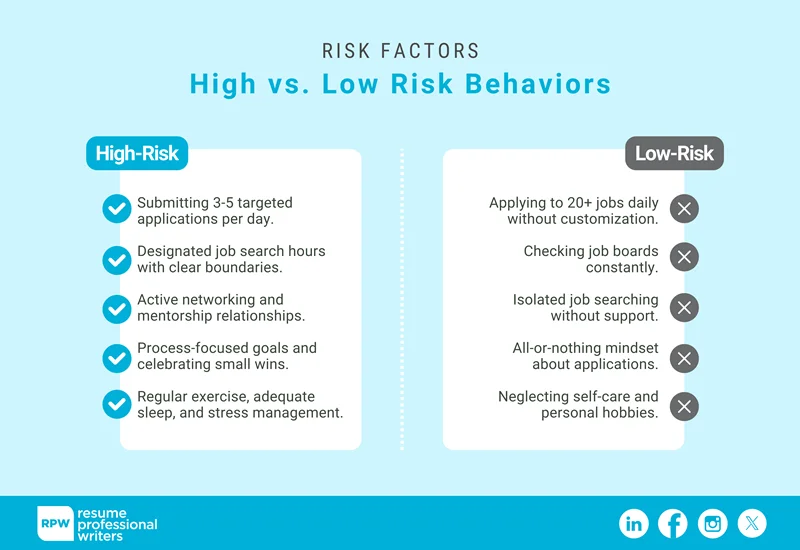Searching for a job can feel like a full-time job in itself. You spend hours tailoring resumes, writing cover letters, preparing for interviews, and waiting for replies that sometimes never come. Over time, this repetitive process can drain your energy, cloud your confidence, and lead to what many professionals experience but rarely discuss—job search burnout.
In this article, we’ll explore the signs, causes, and solutions for job search burnout—and how leveraging resume writing services can help you recover faster, regain motivation, and approach your job search with renewed clarity and confidence.

What Is Job Search Burnout?
Job search burnout is the state of emotional, mental, and physical exhaustion caused by prolonged job-hunting stress. It’s common among professionals who invest tremendous effort into applications, networking, and interviews—only to face constant rejection or silence.
Unlike typical work burnout, which results from an overload of tasks, job search burnout stems from uncertainty and lack of progress. Every unanswered application feels like a blow to your self-esteem, while each rejection can reinforce self-doubt. Over time, the emotional toll builds up until you start feeling numb, hopeless, or detached from your goals.
You might recognize job search burnout if you’re:
- Feeling unmotivated to apply for new roles
- Doubting your skills and worth
- Losing focus during interviews or networking events
- Struggling to maintain optimism despite effort
- Questioning whether the right opportunity even exists
If this sounds familiar, you’re not alone—and more importantly, it’s fixable.
Why Job Search Burnout Happens
Burnout doesn’t occur overnight. It’s a gradual buildup of stress and disappointment when effort doesn’t lead to visible progress. Understanding the underlying causes is the first step toward recovery.
1. Constant Rejection or Lack of Feedback
Job seekers often submit dozens of applications without hearing back. The silence can make you feel invisible, leading to frustration and discouragement.
2. Unrealistic Expectations
Many professionals enter the job market expecting quick results. When weeks turn into months, expectations clash with reality—and burnout begins to form.
3. Overworking the Process
Applying for jobs non-stop, checking email every few minutes, or spending hours perfecting every cover letter can cause mental exhaustion.
4. Unclear Strategy
Without a focused job search plan—like targeting specific industries, job titles, or companies—your efforts can scatter in too many directions. This lack of structure fuels inefficiency and stress.
5. Poorly Optimized Application Materials
Even skilled candidates often overlook how important a strong resume and LinkedIn profile are to securing interviews. When applications don’t perform, frustration grows and confidence dips further.
6. Financial and Social Pressures
Bills, family expectations, or societal comparison (especially via LinkedIn) can add extra emotional strain to an already taxing process.
Understanding Job Search Burnout: Key Concepts and Warning Signs
Job search burnout often builds gradually, making it difficult to spot until motivation and confidence start to fade. This section breaks down the key concepts behind burnout and the early warning signs every job seeker should recognize before it disrupts their progress.
Core Definitions and Symptoms
Job search burnout represents chronic stress from prolonged job hunting activities that goes beyond normal job search anxiety. This condition manifests through three core components that distinguish it from temporary frustration or disappointment:
Exhaustion: Physical and emotional depletion that doesn’t resolve with brief breaks. You may experience persistent fatigue even when you haven’t been actively searching, difficulty concentrating during interviews, and feeling overwhelmed by simple job search activities like updating your resume or writing cover letters.
Cynicism: A negative, detached attitude toward the job search process, employers, and your prospects. This includes feeling that the hiring process is rigged, that companies don’t value candidates, or that networking feels inauthentic and pointless.
Reduced Efficacy: A declining sense of accomplishment and effectiveness in your job search efforts. You may notice your job applications becoming less tailored, interview performance suffering, or avoiding valuable job search strategies like networking because they feel futile.
Physical symptoms often include headaches, sleep disruption, appetite changes, and general fatigue that persists even during your free time. Emotional symptoms manifest as frustration, anxiety, depression, irritability, and self-doubt about your skills and career direction. Behavioral symptoms include procrastination on job applications, social withdrawal from professional networks, and panic when applying to unsuitable roles without proper research.
The Burnout Cycle and Its Progression
Job search burnout follows a predictable progression that creates a self-perpetuating cycle. Initial enthusiasm for finding a new job gradually shifts to frustration as rejections accumulate and feedback remains scarce. This frustration evolves into cynicism about the entire process, leading to reduced effort in job search activities.
The cycle deepens when decreased effectiveness leads to more rejections, reinforcing negative beliefs about your prospects. Various factors contribute to this progression: lack of control over hiring timelines, unclear expectations from different employers, workload swings between intense application periods and waiting phases, and isolation from professional support networks.
This burnout connects to related career challenges like imposter syndrome, where you question your qualifications despite evidence of your competence, and career anxiety, which can manifest as overwhelming worry about your professional future. Understanding these connections helps you address burnout more comprehensively rather than treating isolated symptoms.
Job Search Burnout Risk Factors and Comparison Table
Understanding what triggers job search burnout is the first step to preventing it. While every job seeker experiences stress differently, certain factors—such as prolonged unemployment, poor resume performance, or lack of clear direction—significantly increase the risk. The table below compares common burnout risk factors, their impact on job seekers, and practical strategies to reduce their effects.

Step-by-Step Guide to Preventing and Overcoming Job Search Burnout
Step 1: Assess Your Current Burnout Level
Before implementing prevention strategies, honestly evaluate where you stand on the burnout spectrum. Use this self-assessment to identify your current risk level:
Energy and Motivation (Rate 1-5, where 1 = completely depleted, 5 = highly energized)
- Do you feel energized about job search activities?
- Can you maintain focus during application processes?
- Do you feel optimistic about finding the right job?
Attitude and Perspective (Rate 1-5, where 1 = highly cynical, 5 = very positive)
- Do you believe employers genuinely want to find good candidates?
- Do you feel confident in your skills and qualifications?
- Do you view networking as valuable relationship building?
Effectiveness and Accomplishment (Rate 1-5, where 1 = completely ineffective, 5 = highly effective)
- Are you producing quality job applications?
- Do you feel your efforts are leading to meaningful progress?
- Are you successfully scheduling interviews and networking meetings?
Scoring: 12-15 points indicate low burnout risk, 8-11 points suggest moderate risk requiring preventive action, and below 8 points indicate significant burnout requiring immediate intervention and possible professional support.
Tools for ongoing monitoring include weekly check-ins with accountability partners, tracking both leading indicators (applications sent, networking conversations) and lagging indicators (interview requests, response rates), and maintaining a job search journal to identify patterns in energy and motivation.
Step 2: Create a Sustainable Job Search Strategy
Sustainable job searching focuses on consistency over intensity, preventing the boom-and-bust cycles that lead to burnout. Implement time-boxing techniques by dedicating specific daily hours to job search activities—typically 2-3 hours maximum for full-time searching. This creates boundaries that prevent job hunting from consuming your entire day and mental energy.
Adopt a quality-over-quantity approach by submitting 5-10 targeted applications per week rather than 50 generic ones. Research shows that personalized applications have significantly higher response rates, making this strategy both more effective and less depleting. Spend time researching each company, customizing your resume for specific roles, and writing thoughtful cover letters that demonstrate genuine interest.
Set realistic weekly and monthly goals that include both activity-based targets (number of applications, networking conversations) and outcome-based hopes (interview requests, feedback received). Build in buffer time for unexpected opportunities and energy fluctuations.
Schedule mandatory breaks and “unplugged” days where you completely step away from job search activities. This might mean no checking job boards on weekends or taking one full day per week to focus on personal interests, family time, or pure relaxation. These breaks prevent the always-on mentality that quickly leads to exhaustion.
Create different types of job search days: application days for focused research and submissions, networking days for informational interviews and professional events, and skill development days for courses, certifications, or portfolio projects. This variety keeps the process engaging while ensuring comprehensive coverage of job search strategies.
Step 3: Build Your Support Network and Self-Care Routine
Identify 3-5 key support people who can provide different types of assistance during your job search. This might include a mentor in your industry for strategic guidance, a career coach for skill development and accountability, peers in similar situations for emotional support and shared resources, and family or friends for encouragement and perspective outside of work concerns.
Join job seeker groups on LinkedIn, Slack communities for your industry, or local meetups where you can connect with others navigating similar challenges. These groups provide networking opportunities, shared job leads, and most importantly, the reminder that you’re not alone in this process. Many professionals find that helping others in their job search actually boosts their own motivation and confidence.
Establish daily self-care practices that support both physical and mental health. Regular exercise, even just 20-30 minutes of walking, has a significant impact on mood and stress levels. Meditation or mindfulness practices help manage anxiety and maintain perspective during challenging periods. Maintain hobbies and interests that provide identity and accomplishment outside of career concerns.
Create clear boundaries between job search time and personal time. This includes physical boundaries (a dedicated workspace, if possible), temporal boundaries (specific hours for searching), and mental boundaries (techniques for transitioning out of job search mode). Many successful job seekers find that changing clothes, taking a walk, or doing a brief meditation helps them transition between job search focus and personal life.
Prioritize adequate sleep, as sleep disruption both contributes to and results from job search stress. Establish consistent sleep schedules, limit screen time before bed, and create a relaxing bedtime routine that helps your mind shift away from job search concerns.
How Professional Resume Writing Services Can Help
When job search fatigue hits, professional help can make the difference between staying stuck and regaining momentum. Here’s how resume writing experts can lighten your load:
1. Objective Perspective – Resume writers evaluate your experience with a fresh, unbiased eye. They know how to position your achievements to attract recruiters.
2. Keyword Optimization – They ensure your resume meets ATS (Applicant Tracking System) requirements—so your applications don’t get filtered out before reaching hiring managers.
3. Professional Branding – A well-written resume and LinkedIn profile reinforce your personal brand, aligning your qualifications with the job market’s current demands.
4. Saved Time and Reduced Stress – When experts handle the writing, you can focus on preparing for interviews and maintaining your well-being.
5. Higher Response Rates – Candidates who invest in professional resume services often see measurable improvements in callbacks and recruiter engagement—reducing the burnout cycle significantly.
Real-Life Recovery Success Story and Walkthrough
Sarah, a marketing professional with eight years of experience, found herself trapped in job search burnout after months of unsuccessful searching. Her starting situation included over 300 applications submitted across six months, zero interviews scheduled despite her strong background, and severe anxiety that was affecting her sleep, relationships, and confidence.
Starting situation details: Sarah was applying to 15-20 positions daily using a generic resume and cover letter. She spent 8-10 hours daily on job boards, constantly refreshing listings and comparing herself to other professionals on LinkedIn. She had isolated herself from her professional network due to embarrassment about her unemployment and was experiencing panic attacks before the few phone screenings she did receive.
Strategic intervention steps: Sarah began working with a career coach who helped her recognize the burnout pattern and implement systematic changes. First, she reduced her daily application time to 3 hours maximum and focused on 3-5 carefully selected positions per week. She updated her LinkedIn profile and began engaging authentically with former colleagues’ content rather than hiding her job search.
Sarah joined a job seekers support group that met weekly, providing both networking opportunities and emotional support from others in similar situations. She implemented a daily exercise routine and began practicing meditation to manage anxiety symptoms. Most importantly, she shifted from reactive applying to proactive networking, reaching out to former colleagues and industry contacts for informational interviews.
She also invested time in skill development, completing a digital marketing certification that addressed gaps she had identified in her background. This provided both practical value and a sense of forward progress during the search process.
Final results and transformation: Within six weeks of implementing these changes, Sarah had scheduled four interviews and received two job offers. She accepted a senior marketing manager role with a 40% salary increase compared to her previous position. More importantly, she reported feeling confident and excited about her career direction rather than anxious and defeated.
Before/after comparison:
- Daily routine shifted from 10 hours of scattered applying to 3 hours of strategic job search plus self-care activities
- Mindset changed from scarcity and panic to abundance and strategic thinking
- Network engagement increased from zero contacts to 2-3 meaningful professional conversations weekly
- Physical health improved through regular exercise and stress management
- Interview performance enhanced through reduced anxiety and increased confidence
The key lesson from Sarah’s experience is that recovery from job search burnout requires both strategic changes to search methodology and holistic attention to mental and physical well-being. The combination of focused effort, community support, and self-care created a positive cycle that accelerated both her search timeline and her overall satisfaction with the process.
Break the Burnout Cycle and Move Forward with Confidence
Job search burnout is real—but it’s not permanent. With the right balance of self-care, structure, and professional support, you can regain motivation and achieve your career goals.
If the process feels draining, don’t struggle in silence. A professionally written resume can transform how recruiters perceive your value, helping you secure interviews faster and focus your energy where it matters most—your future career success.
Frequently Asked Questions
How long is too long for a job search before burnout becomes inevitable?
Most career experts suggest reassessing your strategy after 3-4 months of active searching, as job hunts extending beyond 6 months significantly increase burnout risk. However, the timeline varies based on industry, seniority level, and market conditions. The key is recognizing when your current approach isn’t working and making strategic adjustments rather than continuing ineffective tactics. If you’re feeling signs of burnout earlier, don’t wait for an arbitrary timeline—address it immediately.
Is it normal to feel completely unmotivated after multiple rejections?
Yes, motivation dips are completely normal responses to rejection and uncertainty. However, a persistent lack of motivation lasting 2+ weeks may indicate developing burnout requiring active intervention. Temporary discouragement after rejection is expected; chronic apathy toward opportunities that previously excited you signals a need to step back, reassess your approach, and potentially seek support from career professionals or mental health counselors.
Should I take a complete break from job searching if I’m burned out?
Short breaks of 3-7 days can be highly beneficial for rest and perspective, but longer breaks may increase anxiety about falling behind or losing momentum. Instead of stopping completely, focus on reducing intensity while maintaining some forward progress. This might mean limiting applications to one per day, focusing solely on networking, or spending time on skill development rather than actively applying. The goal is sustainable progress, not complete disengagement.
How do I explain employment gaps caused by burnout to potential employers?
Frame gaps positively as time spent on professional development, skill building, or strategic career planning rather than mentioning burnout directly. For example: “I took time to complete advanced certifications in [relevant area]” or “I used this period to clarify my career direction and identify opportunities where I could make the strongest impact.” Focus on what you gained during the gap rather than what caused it. Most employers understand that career transitions take time and appreciate candidates who are thoughtful about their next steps.
Can job search burnout affect my interview performance even after I start getting interviews?
Absolutely. Burnout often manifests as reduced energy, pessimistic outlook, and decreased confidence—all of which significantly impact interview performance. If you’re experiencing burnout symptoms, address them before major interview opportunities. Practice positive self-talk, ensure adequate rest before interviews, and consider working with a career coach to rebuild confidence and interview skills. Remember that interviews are conversations about mutual fit, not evaluations of your worth as a person.
What’s the difference between job search burnout and clinical depression?
Job search burnout is specifically tied to the stress and challenges of finding employment, while clinical depression affects mood and functioning across all life areas. However, they can co-occur, and prolonged job search burnout may contribute to or unmask depression. If you’re experiencing persistent sadness, hopelessness, changes in appetite or sleep, or thoughts of self-harm, seek professional mental health support immediately. A qualified therapist can help you distinguish between situational stress and clinical concerns requiring treatment.








